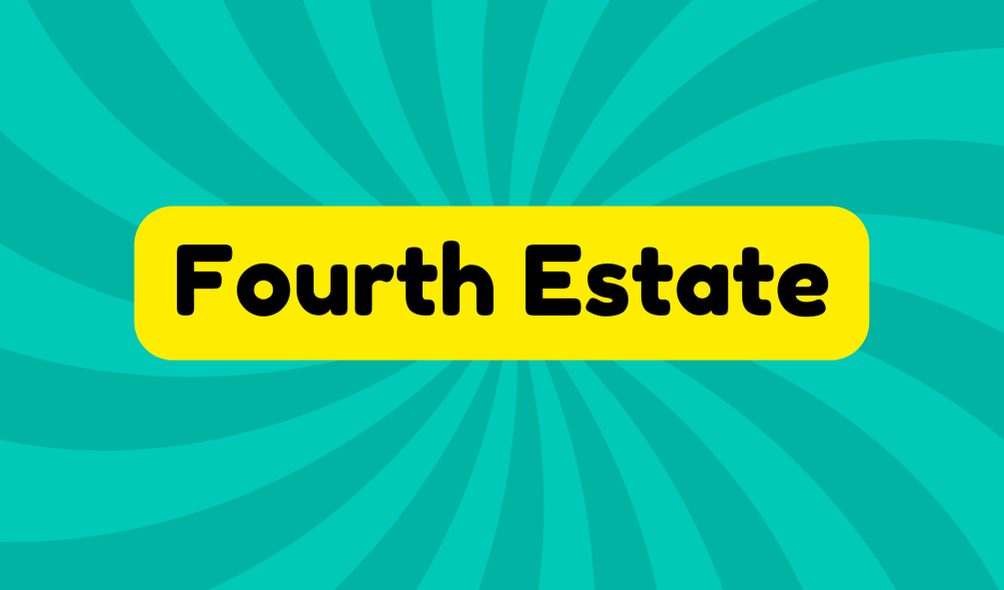The term "Fourth Estate" denotes the press's vital role in democracy, responsible for monitoring government actions, ensuring accountability, and informing the public. Originating from the traditional divisions in society, it reflects the increasing influence of journalists in shaping political discourse. Figures like Edmund Burke underscored this impact. Contemporary challenges, such as misinformation and information overload, threaten public trust in the media. A reliable press is essential for maintaining an informed citizenry and promoting checks on authority. As the Fourth Estate evolves, its relevance in today's society endures, hinting at deeper complexities and pressing issues awaiting exploration.
Synonyms
The term "fourth estate" is synonymous with several phrases that encapsulate the essence of the press and journalism within society. These synonyms highlight the critical functions and responsibilities of the media, especially concerning media accountability and journalistic integrity. Understanding these alternate expressions enriches our comprehension of the press's role in democracy, particularly in an era marked by skepticism towards media.
- Watchdog of Democracy
- The Informative Voice
- Guardian of Public Interest
- Reporting Collective
- Society's Mirror
Each phrase emphasizes the importance of a vigilant and responsible press. As the media landscape evolves, these synonyms remind us of the pressing need for transparency, trustworthiness, and accountability in journalism, which are crucial for maintaining societal health and informed citizenry.
Example of Sentences
Examples of sentences illustrating the significance of the fourth estate can provide valuable insights into its role in society. The press serves as a crucial mechanism for ensuring democratic accountability and upholding journalistic integrity.
- The fourth estate functions as a watchdog, monitoring government actions.
- News organizations have a duty to report without bias or distortion, maintaining trust.
- Investigative journalism can uncover corruption and hold power to account.
- In times of crisis, the media's role in delivering fact-based information is imperative.
- A healthy democracy thrives on the vigilance of a free press, which challenges abuses of power.
Through these examples, the fundamental nature of a strong, principled fourth estate becomes evident, even amid challenges to its credibility.
Origin
Emerging from the historical framework of European society, the term "fourth estate" initially referenced the three traditional estates: the clergy, nobility, and commoners. As the press evolved, it began to represent the growing influence of journalists in shaping public discourse and holding power accountable. This transformation occurred against a backdrop of societal change, highlighting the importance of a critical and informed citizenry. Remarkably, early attributions by figures like Edmund Burke emphasized the societal impact of reporters on political dynamics. However, as the fourth estate's role intensified, questions arose about its responsibility and reliability. In a digital age marked by information overload, the historical context of the fourth estate remains essential in understanding its ongoing relevance and challenges in modern democracies.
Collocations
Collocations surrounding the term "fourth estate" reflect its multifaceted significance in contemporary discourse. These combinations illuminate the relationship between the press and society, especially regarding press accountability and media influence. Recognizing the urgency of this dynamic, we observe how language captures the essence of media's role today:
- press accountability measures
- media influence strategies
- scrutiny of news narratives
- watchdog functions of journalism
- public trust in reporting
These phrases highlight a critical lens through which we can examine the media landscape. As audiences increasingly navigate a complex information environment, it becomes essential to engage with these concepts actively. Understanding the implications of these collocations encourages a more thoughtful analysis of how journalism shapes public perception and supports democratic integrity.
How to Use in Everyday Language
The concept of the "fourth estate" can be effectively integrated into everyday conversations to underscore the importance of the media in society. By referencing the term, individuals can highlight discussions about press ethics and the critical role media plays in ensuring democratic accountability. For example, one might say, "In evaluating our current political climate, it is crucial to contemplate how the fourth estate holds leaders accountable." This use not only acknowledges media's watchdog function but also encourages a nuanced understanding of its responsibilities. Additionally, discussing the pitfalls of media misinformation fosters skepticism while reinforcing the need for integrity in journalism. Ultimately, weaving the term into dialogue elevates discussions on media's role and its accountability to the public, fostering informed conversations.
Why Is It Still Relevant Today?
Why does the concept of the fourth estate remain relevant in today's rapidly evolving media landscape? As technology reshapes how we consume information, the role of journalism in conducting impact assessments is increasingly crucial. Modern media evolution has democratized information distribution, yet it has also given rise to misinformation and fragmented public discourse. The fourth estate serves as a critical counterbalance, holding power accountable and ensuring diverse perspectives are heard. In this digital age, maintaining public trust is paramount; hence, a committed press is essential to address inaccuracies and uphold transparency. While challenges abound, the foundational necessity of a robust fourth estate remains undeniable, as it validates the informed citizenry democracy demands, ultimately shaping a more equitable society.







